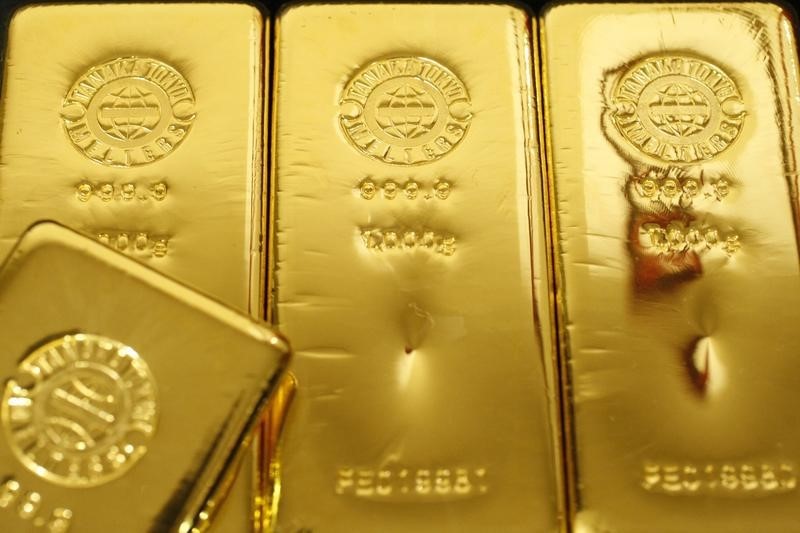Investing.com - Gold prices fell to a four-month low on Wednesday, as investors continued to monitor developments surrounding Greece's debt crisis and as losses mounted on Chinese stock markets.
Gold futures for August delivery on the Comex division of the New York Mercantile Exchange hit an intraday low of $1,146.20 a troy ounce, a level not seen since March 18, before trading at $1,150.00 during European morning hours, down $2.60, or 0.23%.
A day earlier, gold tumbled $20.60, or 1.76%, to close at $1,152.60. Futures were likely to find support at $1,142.40, the low from March 17, and resistance at $1,168.50, the high from July 7.
Also on the Comex, silver futures for September delivery declined 12.6 cents, or 0.84%, to trade at $14.84 a troy ounce. On Tuesday, silver fell to $14.62, the weakest level since December 1.
At an emergency euro zone summit in Brussels on Tuesday evening, European leaders handed Greece a five-day deadline to submit a detailed package of reforms to international creditors in return for a bailout.
Failure to reach an agreement would increase the likelihood of Greece leaving the single currency union.
The Greek government was to present a formal application later Wednesday for a new rescue package from the European Stability Mechanism, the euro zone’s permanent bailout fund.
Greek banks were set to remain closed through Wednesday after capital controls were extended, amid concerns that lenders are close to running out of cash. Banks have been shuttered since last Monday, with ATM withdrawals limited to €60 per day.
The ECB said Monday that it would keep its emergency liquidity assistance to Greece capped at levels announced last Monday. However the ECB demanded that Greek banks put up more assets as collateral to secure the emergency funding, adding to pressure on Athens.
Uncertainty over Greece has so far failed to spur increased investor demand for gold, often perceived as a safe-haven asset.
Instead investors have flocked to the U.S. dollar, which hit a five-week high against a trade-weighted basket of six major currencies on Tuesday.
A stronger greenback is usually a negative for raw materials as it makes the commodities more expensive for users of other currencies.
Elsewhere in metals trading, copper for September delivery hit an intraday low of $2.384 a pound, a level not seen since July 2009, before trading at $2.411 during European morning hours, down 3.6 cents, or 1.47%.
A day earlier, copper tumbled 9.1 cents, or 3.61%, to close at $2.446 as concerns over Greece's debt crisis and mounting losses on Chinese stock markets weighed.
Shares in China plunged further on Wednesday despite fresh efforts by the government to calm the market.
The Shanghai Composite tumbled nearly 6% in volatile trade on Wednesday after having fallen as much as 8% shortly after the open with trading in more than 500 companies listed in Shenzhen and Shanghai suspended. The index is down almost 37% over the past four weeks.
The People's Bank of China said it was watching market movements and would act to eliminate systemic and regional risks as a result of selling.
The China Insurance Regulatory Commission said ahead of the open it would increase the limit on how much insurance companies can spend buying blue-chip stocks to as much as 40% of total assets from 30%.
Market players are concerned that the plunge in the stock market could spread to other parts of the Chinese economy, triggering fears that the Asian nation's demand for the industrial metal will decline.
China is the world’s largest copper consumer, accounting for almost 40% of world consumption last year.
